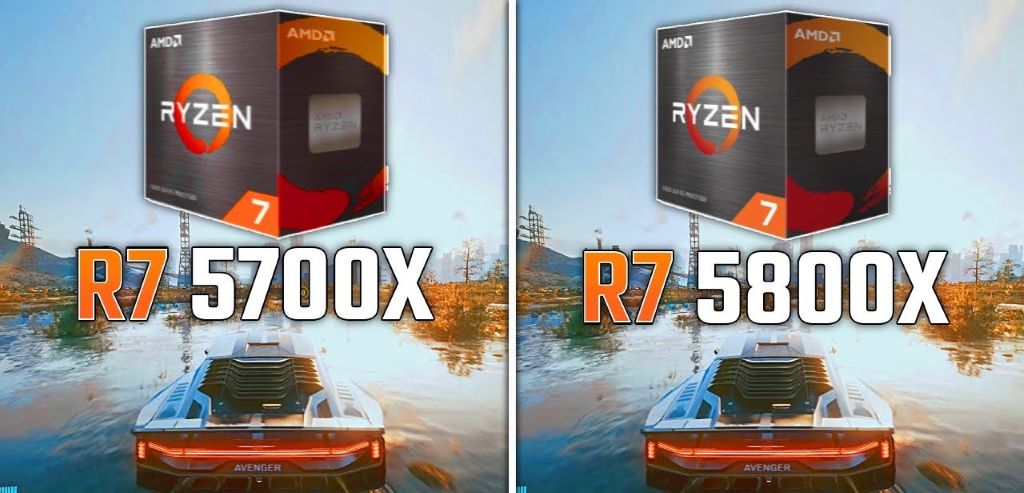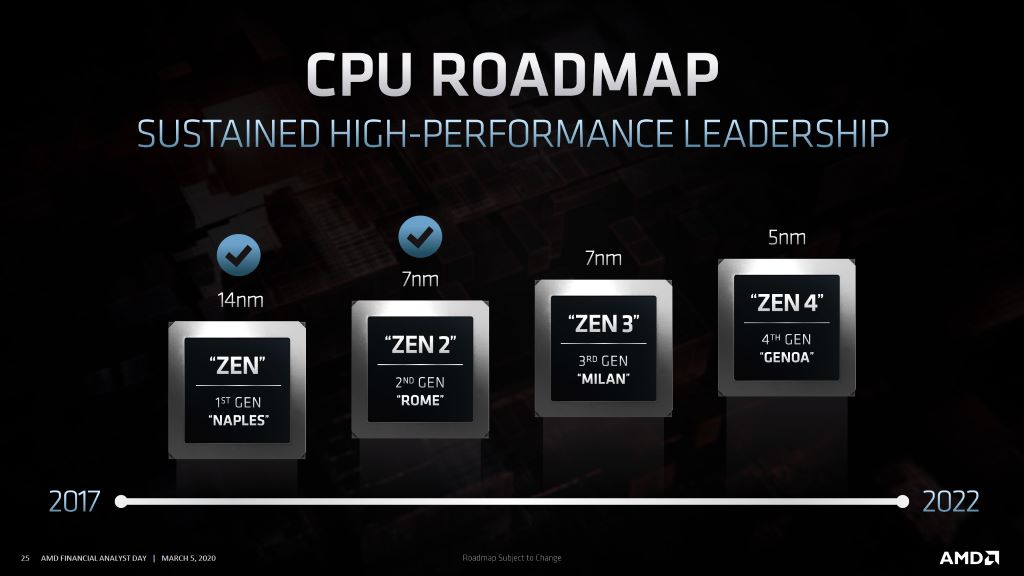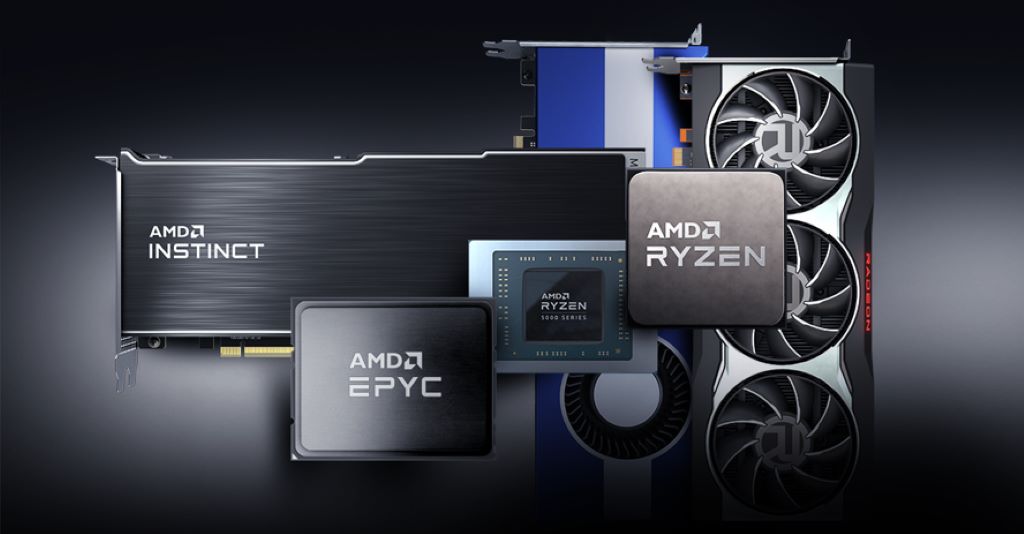
06 Dec 5700x Vs 5800x: Which CPU is Best?
Alright, tech fans. Battle lines are being drawn as AMD’s latest Zen 4 processors face off. In one corner we have the Ryzen 7 5700X, an 8-core beast aiming to deliver excellent multi-threaded muscle. And in the other, its older sibling – the 8-core powerhouse Ryzen 7 5800X built on Zen 3 architecture. These two processors go toe-to-toe, topping the mid-range lineup for AMD’s Ryzen 7 series. But when it comes to bang for your buck, which CPU reigns supreme? Let’s dig into the specs and benchmarks to find out!
5700x Vs 5800x at a Glance
| Feature | Ryzen 7 5700X | Ryzen 7 5800X |
| Cores | 8 | 8 |
| Threads | 16 | 16 |
| Base Clock | 3.8 GHz | 3.9 GHz |
| Boost Clock | Up to 4.6 GHz | Up to 4.7 GHz |
| L3 Cache | 36 MB | 36 MB |
| TDP | 65W | 105W |
| Overall | Great value for gaming and productivity | Best for high-end gaming and demanding workloads |
A Generational Gap in AMD’s Midrange
AMD launches a new Ryzen generation like clockwork – every year to 18 months. And with each new release, they push the performance envelope. The Ryzen 7 5700X landed in September 2022 wielding cutting-edge Zen 4 cores that promise big performance gains. Meanwhile, its predecessor – the venerable Zen 3-based Ryzen 7 5800X – arrived back in November 2020.
So, between these two contenders, we’re seeing a two-year generational gap. Translated into CPU terms, we’re talking light years of progress. But AMD has kept pricing surprisingly consistent despite that huge technology leap. You can grab the new Zen 4 Ryzen 7 5700X today for only $20 more than its Zen 3 counterpart originally sold for.
Of course, now that some time has passed, 5800X discounts are starting to appear, too. So you might catch last-gen deals pitting these two head-to-head at similar price points. But which CPU should you choose to power a new build today? Let’s weigh up exactly what both chips bring to the table!

Zen 4 Core Power or Zen 3 Maturity?
Obviously, the Ryzen 7 5700X’s cutting-edge Zen 4 architecture gives it bragging rights for bleeding-edge tech straight out of the gate. AMD promises around 13% faster single-thread speed from the improved core design. Plus, they optimized power draw, allowing higher clock speeds before hitting the chip’s wattage limits.
But the previous-gen Ryzen 7 5800X certainly isn’t outdated yet either. It still packs a punch with excellent 8000-series Zen 3 cores developed on TSMC’s 7nm process. During its reign, this CPU crushed gaming and content creation workloads alike. In fact, it still trades blows with Intel’s flagship Core i9-12900K in many benchmarks today.
Benchmarks – Which CPU Should Take the Crown?
Specs and market hype aside, real-world performance always comes down to benchmarks. So let’s compare some major metrics between these two processors head-to-head:
Productivity Performance
For serious number crunching, creative work, code compiling, and other demanding productivity tasks, multicore power becomes critical. And the Ryzen 7 5800X has certainly left big shoes to fill. It swept through workflows up to 10-15% quicker than the previous generation, even beating pricier competitors.
But now the Ryzen 7 5700X is here to claim that crown. Anandtech saw the 5700X scoring up to 36% higher than the 5800X in raw multi-core compute tests. And when looking at specific creative workloads, its advantage remained between 25-34% faster rendering, encoding, compiling, and more.
So why does the Ryzen 7 5700X achieve such a giant generational performance leap? Two words – core efficiency. Each Zen 4 core draws less power and squeezes more processing into every clock cycle while hitting higher frequencies too.
It’s a double whammy that carves out a strong lead over Zen 3. But there are still a few areas where the maturity of previous-gen DDR4 memory support helps the 5800X stay competitive…
Gaming Framerates
Now for the million dollar question – how much better can these CPUs drive your favorite games? When it comes to gaming, framerates rule. And here the generational benchmark gap does tighten up.
Reviewers found both CPUs achieving between 5-15% higher average and 99th percentile framerates across a spectrum of games compared to the previous generation. Not a bad uplift for a yearly upgrade!
However, the Ryzen 7 5700X’s FPS margins stay fairly narrow at 1080p resolution – an area where CPU power matters most. For example, Tom’s Hardware saw only a 5% avg gain in Hitman 3 at 1080p over the 5800X with an RTX 3090. Meanwhile TechPowerUp averaged less than a 9% lead across several AAA games.
But why doesn’t a 25-35% multi-core jump directly translate to bigger 1080p FPS gains? It turns out memory latency tied to the new AM5 platform holds things back. DDR5 is still ramping up speeds and tweaking timings. So tuning is a work in progress.
However, the Ryzen 7 5700X does stretch its legs more as graphics settings and resolution rise. There the GPU becomes the bottleneck, allowing the Zen 4 cores to stretch their muscles. By 4K intense GPU-bound gaming, most benchmark deltas disappear between these two processors.
Efficiency – The Angle of Zen 4’s Advantage
While benchmarks determine winners in raw speed, efficiency charts a path towards longer-term victory. AMD poured engineering effort into optimizing Zen 4 inside and out to do more with less power. So how does efficiency stack up moving from Zen 3 to 4?
Looking holistically from performance per watt to battery life impacts, Zen 4 sweeps the field. For example, running Cinebench the Ryzen 7 5700X scores over 60% higher efficiency reaching its performance peak. It also coasts along using around a third less juice at lower compute loads.
These radical efficiency jumps really change the battery life equation for Zen 4 mobile chips later too. Even heaviest work barely touches the Ryzen 7 5700X’s surface power limits either. So expect cool and virtually silent operation under full load. By comparison, the Ryzen 7 5800X pushed thermal headroom much harder to reach its compute potential.
Engineering feats like this widen AMD’s process lead tremendously. And efficiency advances pave the way for future design flexibility too – like cramming more next-gen Zen 5 cores into the same thermal limits someday.
Overclocking Headroom
Now CPU overclocking might not be your thing personally. But performance junkies get weak knees for any extra MHz they can squeeze from a chip. So which model offers more overclocking joy?
Well technically both max out around the same 4.7GHz frequency mark today if you won the silicon lottery. However, rumors point towards higher overclocking limits coming for Zen 4 after more BIOS maturation. And again, Zen 4’s radically improved efficiency gives it thermal legroom to spare even at stock settings.
So the Ryzen 7 5700X probably keeps more untapped potential up its sleeve for future tweaking. Just make sure any overclock testing keeps voltages moderate on those cutting-edge Zen 4 cores though!
Price vs Performance – Can Zen 3 Still Deliver?
Pitting these two processors directly against each other for bang-per-buck really depends on retail prices week to week. Due to inflation and shortages, tech pricing constantly fluctuates today.
At launch the Ryzen 7 5700X rang up for $50 more than the 5800X’s initial MSRP. However, now the 5800X often sells at a discount or with free games bundled in. If you catch one of those deals, the value pendulum may swing back towards Zen 3 again.
But theoretically AMD’s own $50 price increase directly from 5800X to 5700X aims to precisely offset generational performance improvements around 15%. So if you nail both CPUs at the same current market price, Zen 4 easily delivers better productivity, efficiency, and future-proofing per dollar invested today.
However, keep two wildcards in mind that could change the math for certain buyers:
- Memory/platform costs – Buying into AM5 brings pricier X670 motherboards and mandatory DDR5 RAM. So factor another $150 to $250 onto a full system upgrade.
- Graphics-bound gaming – If all you do is game at 1440p or 4K settings, the 5800X and faster GPU combos can achieve equivalent real-world FPS for less money today.
Ultimately Shop around and run the math for your own particular performance needs and budget!

The Ryzen 7 5700X – A Special Architecture for Specialized Users
Alright, so by this point the Ryzen 7 5700X clearly comes out ahead in raw future-ready performance. No contest. But I think a key perspective is understanding exactly who should consider buying it.
See, as AMD’s new $299 mainstream flagship, the Ryzen 7 5700X sells itself as a jack-of-all-trades processor ready for high-refresh gaming and heavy creating alike. But dig deeper below the market hype and a more nuanced reality appears. This CPU prioritizes efficiency and multicore productivity over outright gaming leadership.
Now that doesn’t mean the 5700X can’t power pretty much any workload or game smoothly today. Certainly! But based on the benchmarks so far, buyers who live exclusively in FPS-land might feel better value sticking with Zen 3 or hopping over to Intel still.
Whereas specialized users – like programmers, designers, animators, engineers, compilers, or streamers running intensive parallel workloads – can validate paying a premium for Zen 4’s excellent multicore and efficiency transforms today.
In many ways the Ryzen 7 5700X feels almost positioned as a baby brother to AMD’s heavyweight 16-core beasts optimized for similar tasks. It brings users with lighter core needs a taste of that same forward-looking data center DNA for the first time.
So in the end, choosing between these processors depends greatly on understanding your applications. The Ryzen 7 5800X continues blasting out strong framerates for pure gaming. But the 5700X ushers in a new age prioritizing efficiency in productivity while still driving smooth gaming too. Just make sure you pick the right tool optimized for your needs!
Wrapping Up
Alright, so after going 12 rounds with these two contenders, what’s my final verdict? Honestly, AMD has an embarrassment of riches with both the Ryzen 7 5700X and 5800X offering tremendous performance for the money. While supply lasts, the 5800X in particular still punches way above its weight class thanks to Zen 3’s sustained excellence.
But as the new hotness in town, the Ryzen 7 5700X undoubtedly seizes the performance crown today – even if by a more modest margin for mainstream gaming. Its Zen 4 cores put efficiency first without sacrificing smooth FPS either. For specialized prosumers running intensive workflows, I’d absolutely recommend paying a small premium to upgrade. But value-focused PC gamers can still ride happily into the sunset with a 5800X as well!
So at the end of the day, AMD continues demonstrating why they dominate processors below $500. Here’s to many more exciting Ryzen battles ahead! Let me know if this overview helped explain the differences between these two CPUs at all. I’m happy to chat benchmarks, build advice, or tech news anytime!
Frequently Asked Questions
Q: How much better is the Ryzen 7 5700X for gaming compared to the 5800X?
A: On average, the Ryzen 7 5700X provides around a 5-15% boost in gaming framerates across 1080p, 1440p, and 4K resolutions. The wide range depends on game and graphics engine optimization among other factors. However, the gains are most modest at intensive 1080p settings where legacy DDR4 latency constraints slightly limit Ryzen 7 5700X performance still. Overall though, both CPUs power smooth high-refresh gaming.
Q: Does the Ryzen 7 5700X run a lot cooler than previous generations?
A: Absolutely! The Zen 4 architecture improves efficiency tremendously allowing the CPU to squeeze more performance from less power and run cooler. Ryzen 7 5700X owners can expect temperatures up to 10°C cooler than a 5800X under full load. On top of that, even the 140W Ryzen 9 7950X flagship barely breaks a sweat thanks to Zen 4’s enhanced silicon and manufacturing processes.
Q: Should I upgrade to the Ryzen 7 5700X from a older processor like Ryzen 5 3600X?
A: If you rely on heavily multi-threaded productivity workflows for work or demanding content creation as a prosumer, the upgrade brings massive performance gains worth paying for today. The large IPC and efficiency leaps from the 3600X to 5700X transform how quick you can crunch through projects. For gaming, gains appear more modest at higher resolutions. So factor your budget and applications. But AM5 future-proofs better.
Q: Does DDR5 memory help push Ryzen 7000 performance higher?
A: Certainly! AMD’s Ryzen 7000 platform and Zen 4 architecture depend on speedy DDR5 memory to achieve max performance. However, DDR5 tuning is still maturing on AM5 motherboards at launch. So real-world bandwidth and latency results still trail behind lab testing a bit. But BIOS updates quickly improve compatibility and headroom for 6000+ MHz speeds to better feed the Zen 4 cores.
Q: How does PCIe 5.0 support improve performance on the new AMD platform?
A: PCIe 5.0 allows next-generation SSDs, GPUs, and add-in cards to transfer data over 5X faster through the chipset and CPU lanes. Real-world access to those blazing peak throughput speeds depends on compatible devices though. So today PCIe 5.0 mostly future-proofs bandwidth for coming generations of storage and graphics upgrades rather than improving FPS or workflow speeds out of the gate. Long term the expanded bandwidth headroom does help though!
In Closing
AMD continues pushing the performance envelope with Zen 4 while keeping power and pricing in check. For creators and specialists running intensive workloads, the Ryzen 7 5700X brings meaningful generational gains today. Exciting times ahead for gamers as they can still ride happily into battle with the discounted 5800X, while eagerly anticipating the enhanced performance of DDR5 memory over DDR4, as AMD triumphs by leading in both efficiency and value across the mainstream computing landscape.


No Comments